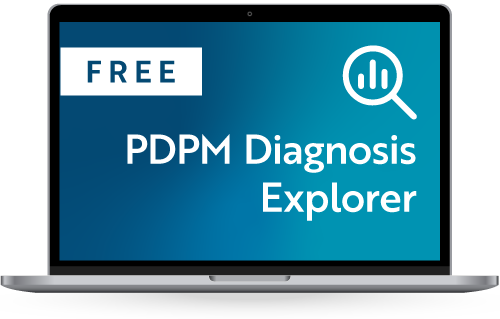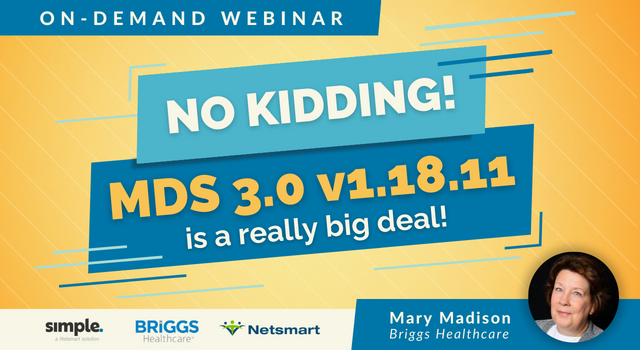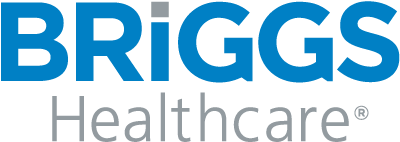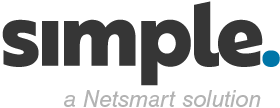Big MDS changes are on the way… and it’s no joke!
Anyone involved in the MDS/RAI process knows that each October brings an updated MDS 3.0 Item Set. We had a break for three years due to COVID, but this October, SNF/LTC facilities will implement an updated MDS Item Set… and it’s not a stretch to call it significant.
This webinar offers an in-depth look at what lies ahead for all staff who work with MDS/RAI processes, including:
- Items from the IMPACT Act that are now part of MDS 3.0 v1.18.11 and their importance for LTC
- Changes to resident interviews
- Items that are significantly different in v1.18.11 from our current version (v1.17.2)
- Resources needed for this new MDS implementation
- How to prepare for v1.18.11 in your facility ahead of Oct. 1, 2023
[On-demand] No Kidding! The MDS 3.0 v1.18.11 is a Really Big Deal!
Watch recording on-demandYour speaker

Mary Madison, RN, RAC-CT, CDP
Clinical Consultant, Long-Term/Senior Care | Briggs Healthcare
Mary Madison, RN, RAC-CT, CDP has 50 years of experience in the healthcare field, with 45 years in the LTC industry. Mary has held positions of Director of Nursing in a 330-bed SNF, DON in two 60-bed SNFs, Charge Nurse, Reviewer with Telligen (Iowa QIO), Director of Continuing Education, Manager of Clinical Software Support, Clinical Software Implementer and Clinical Educator. She has presented numerous webinars and classes on all 3 versions of the MDS throughout the United States during the past 2+ decades as well as many other topics including resident rights, falls, nutrition, Alzheimer’s Disease, dependent adult abuse, falls, etc. Mary joined Briggs Healthcare in 2014 as their Clinical Consultant – LTC/Senior Living.
Webinar sponsors
Share this Post






11 Comments on “[On-Demand] No Kidding! The MDS 3.0 v1.18.11 is a Really Big Deal!”
Can’t get in to register for seminar.
Hi Wanda! Here’s the direct link to the page. Let us know if you still have issues.
When are you going to post the slides for this webinar? We like to make notes and follow along on our slides.
Hi Doris, you can find the slides and recording here – https://www.simpleltc.com/webinar-registration-mds-changes-are-on-the-way/
Where can I find the handouts for today’s webinar-No Kidding! The MDS 3.0 v1.18.11 is a Really Big Deal!
Hi Barbara, the slides and recording are available here – https://www.simpleltc.com/webinar-registration-mds-changes-are-on-the-way/
How can I get the handouts?
Very good, helpful conference.
Hi David, we’re so glad it was helpful for you! The handouts, Q&A document, and recording are all available here – https://www.simpleltc.com/webinar-registration-mds-changes-are-on-the-way/
Hi! Mary Madison here. I have some clarification from and regarding Medicaid Case Mix for the state of Colorado.
I received a call today from Wendy Castro, Colorado State RAI Coordinator. Wendy clarified that the state of Colorado is using PDPM for calculation of state case-mix reimbursement.
I’m providing this update to slides #55 & #56 so you have the correct information.
If you have additional questions regarding Colorado for Medicaid Case Mix, Wendy can be reached at wendy.castro@state.co.us.
Thanks Wendy for providing the latest, correct information for us!!!
To: All Providers Participating in Nebraska Medicaid Program
From: Kevin Bagley, Director
Date: June 26, 2023
Re: Nursing Facility Reimbursement Model Migration from RUGs to PDPM
This provider bulletin is being issued to notify Medicaid nursing facility providers of the upcoming switch to the Patient Driven Payment Model (PDPM) for Minimum Data Set (MDS) assessments.
Effective July 1, 2023, Nebraska Medicaid will switch from Resource Utilization Group III, Version 5.2
Grouper 34 (RUG III) methodology to PDPM for MDS assessments. This change follows an
announcement from the Centers for Medicare and Medicaid Services (CMS) which removes Section G
from MDS assessments effective October 1, 2023.
Due to this decision, Nebraska Medicaid is migrating to the PDPM methodology (nursing component only model) for determining resident care levels effective July 1, 2023.
Nursing facility staff do not need to make changes for eligible residents to be converted to PDPM care levels in the Medicaid Management Information System (MMIS) on July 1, 2023. MMIS staff will run a one-time conversion for all Medicaid-eligible residents with active stays to PDPM classification.
The requirements for accurate MDS assessments have not changed. Facilities must continue to submit
correct and accurate MDS assessments reflecting resident improvements and declines as defined by the Resident Assessment Instrument Manual.
From July 1, 2023, to September 30, 2023, nursing facility monthly care level reports will include RUG III and PDPM data. Effective October 1, 2023, monthly care level reports will only contain PDPM data as the RUG III methodology will end.
PDPM care levels will be based on the nursing component character of the HIPPS (Health Insurance
Prospective Payment System) code. The number of care levels will be reduced from 34 to 25. The table below includes additional information on the updated codes.
The entire Bulletin is found at: https://dhhs.ne.gov/Medicaid%20Provider%20Bulletins/Provider%20Bulletin%2023-17.pdf
New York State Nursing Home Reimbursement Update – Medicaid Case Mix
In a meeting with LeadingAge NY and other associations earlier today (July 11th) on nursing home Medicaid issues, Department of Health (DOH) Bureau of Long Term Care Rate Setting staff shared the State’s intent to move away from a Resource Utilization Group (RUG)-based case mix adjustment and shift to a methodology more in line with the Patient-Driven Payment Model (PDPM) used by Medicare. The Centers for Medicare and Medicaid Services (CMS) will provide limited support for RUG-based methodologies when significant updates to the Minimum Data Set (MDS) are implemented on Oct. 1, 2023. While the State could have opted to continue using RUGs for some additional time by requiring providers to collect assessment items that are being eliminated from the MDS form by completing an additional Optional State Assessment (OSA), NY has decided to shift to a new methodology. However, because that shift requires time to implement, the Department expects that it will need to suspend case mix adjustments for some period of time to facilitate the transition.
This likely means that once established, the January 2024 operating rate will be frozen until the new methodology is implemented. The case mix adjustment in the January 2024 rate will be based on assessments with reference dates spanning April 1st through Sept. 30, 2023. This makes it especially critical that providers ensure that assessments submitted during this final catchment timeframe are complete and accurate.
DOH stressed that while the State has decided not to use the OSA and is in the initial stages of planning a transition to a PDPM-like methodology, key decisions are still under discussion with little additional information available at this time. Given the complexity of implementing a new case mix methodology, we have urged DOH to work with an experienced vendor and to make open, two-way communication with stakeholders a key component of the effort. While avoiding the additional administrative work on the part of nursing staff that the OSA would have required is a positive step, we expressed concern about an open-ended freeze and stressed the need for a clear and predictable timeframe. If done well, the change offers an opportunity to better align payments with actual care costs and incentivize desired outcomes. We welcome member comments and will seek additional input as more information becomes available.
DOH confirmed that it has submitted the State Plan Amendment (SPA) requests related to nursing home and Assisted Living Program (ALP) rate increases to CMS. The amendments implement a 7.5 percent increase to nursing home and Adult Day Health Care (ADHC) rates and a 6.5 percent increase to ALP rates. While DOH is not able to make advance payment of the State share of this increase while the amendment request is pending with CMS, the Department has developed and submitted a rate package for executive review. This will help to expedite payment of the rate increases once federal approval is received. We will monitor progress and keep members informed.
In addition to these announcements, DOH provided status updates on several other issues:
July 2023 rates are under development, with an expected release later this summer.
Intergovernmental Transfer (IGT) SPA for 2022-23 is still awaiting final CMS approval.
No additional insight on when CMS may approve the $187 million safe staffing initiative or 2022-23 CINERGY, which will facilitate payment of the federal share of this funding.
No further update is available on hospital-based nursing home safe staffing funding (which is being handled in a different unit).
Reminder that Residential Health Care Facility (RHCF) Medicaid cost reports are due Aug. 9th.
Contact: Darius Kirstein, dkirstein@leadingageny.org, 518-867-8841